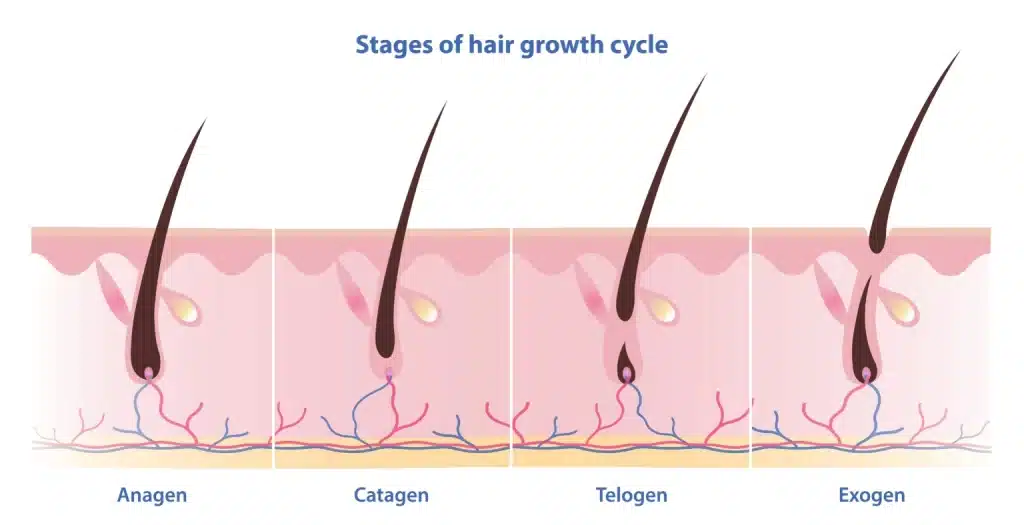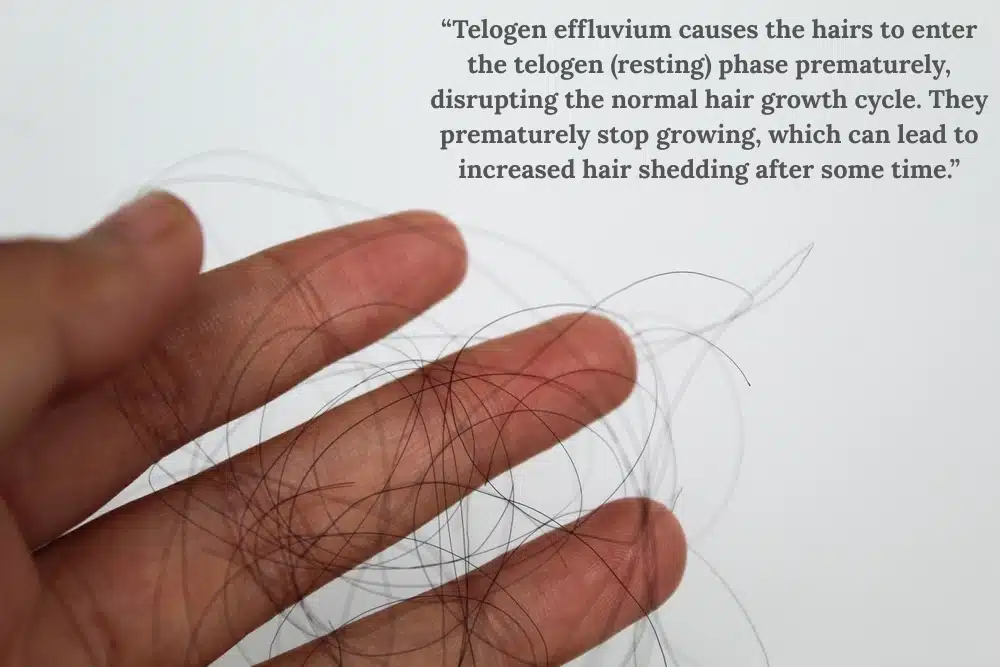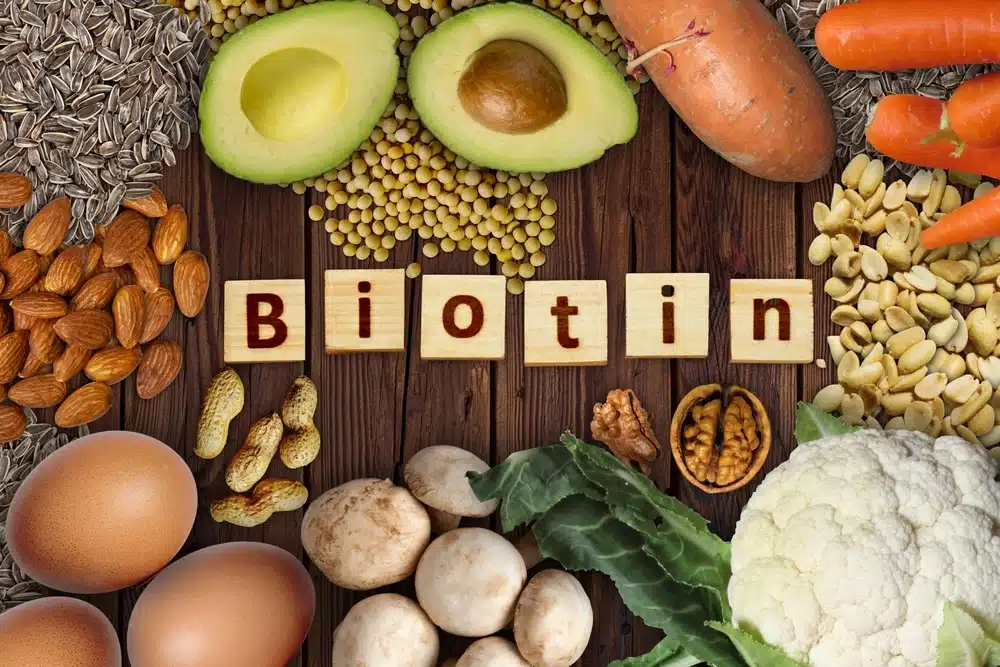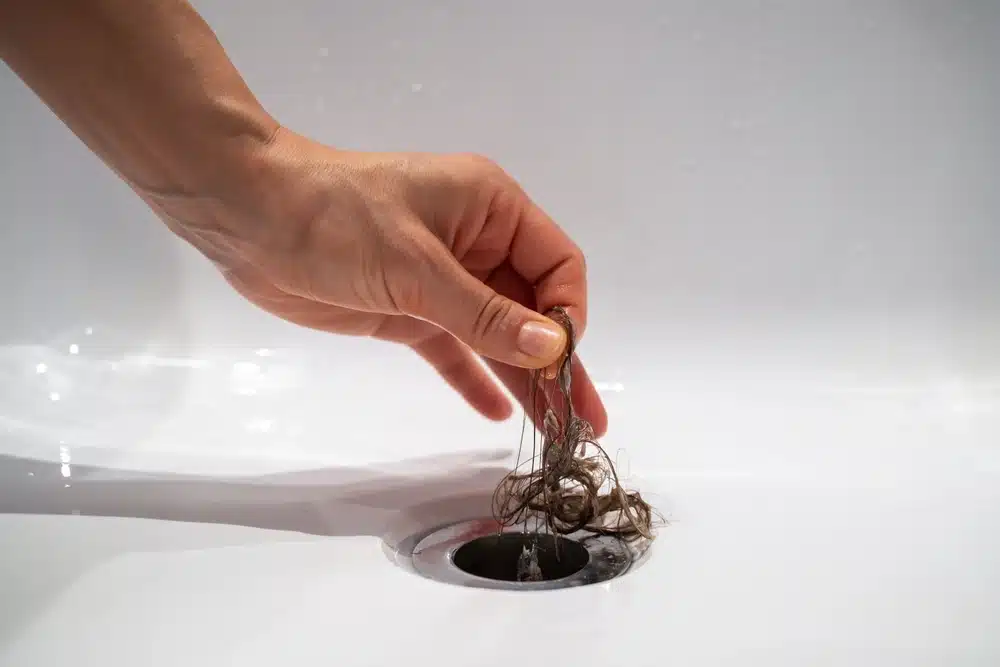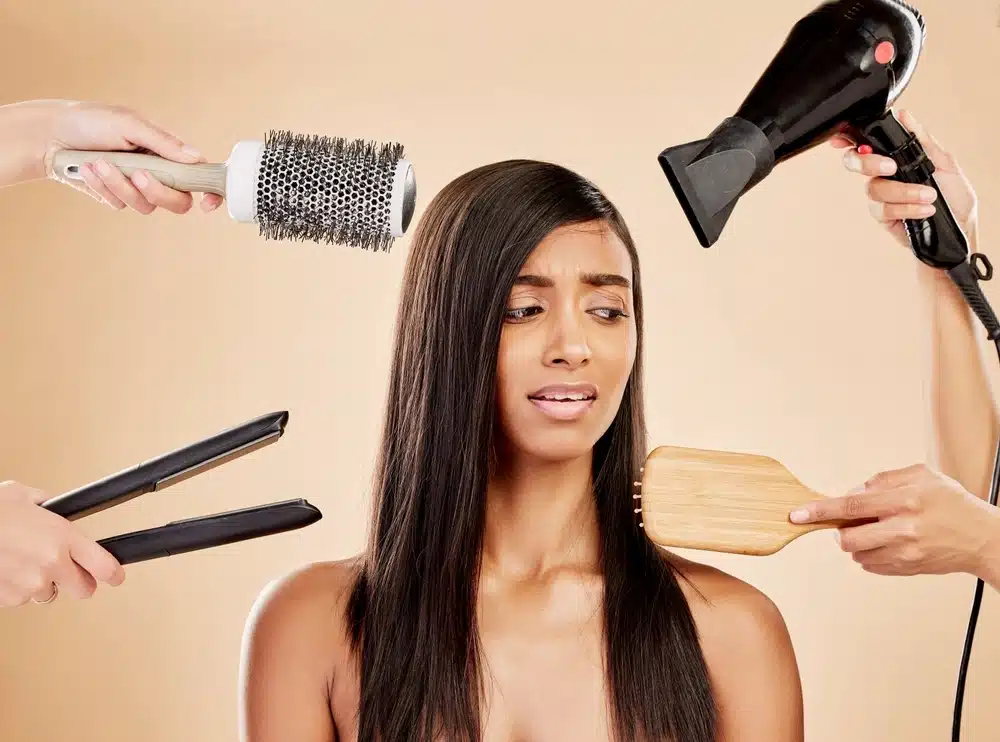A low-carb diet is popular but can impact hair growth if it causes nutritional deficiencies or if there’s rapid weight loss. A person doing low-carb/keto may experience temporary hair thinning and shedding, for example. To combat this, it’s important to track nutrients to ensure a well-rounded diet. At the same time, a low-carb diet may benefit hair due to the lowered sugar intake, which reduces inflammation.
- What is a Low-Carb Diet? A low-carb diet is a specific way of eating that cuts back on carbs. Common carb-heavy foods include pasta, rice, potatoes, and bread.
- Can a Low-Carb Diet Cause Hair Loss? Yes. If a person loses weight too quickly due to a low-carb diet, it can cause telogen effluvium, a type of temporary, stress-induced hair loss. It can also cause hair loss if the individual does not get enough nutrients, particularly zinc, biotin, and vitamins B, D, and C.
- Can a Low-Carb Diet Improve Hair Health? In some cases, yes. A low-carb diet may improve hair health when sugar is cut back, as less sugar can reduce inflammation.
- How to Prevent Hair Loss When Eating a Low-Carb Diet? Make sure you get enough protein and nutrients when eating the diet by consuming foods such as fish, eggs, and greens. Also consider targeted hair loss solutions.
There are many diets available that people use to improve their health. One such diet is the low-carb diet, also commonly known as the keto diet.
While a keto diet can be beneficial for a person’s health, particularly their weight-loss journey, it can also have some less desirable effects.
The question is, is there a link between hair loss and low carb diet? Find out everything you need to know here.
What is a Low-Carb Diet?
First, let’s understand exactly what a low-carb or keto diet is.
Essentially, a low-carbohydrate diet involves restricting the amount of carbohydrates you consume. The carbs avoided typically include:
- Grains (such as rice, wheat, and corn)
- Bread
- Pasta
- Potatoes
At the same time, a person on a low-carb diet will aim to up their protein intake and healthy fat consumption. Its ultimate goal is to aid weight loss while regulating the body’s insulin intake. [1]
A keto diet essentially restricts carbs, fuelling the process of ketosis. When in this state of ketosis, the body burns more fat, leading to weight loss. [2]
Can a Low-Carb Diet Cause Hair Loss?
Unfortunately, yes, but not directly.
The reason a low-carb diet may cause hair loss isn’t exactly because of the lack of carbs; instead, it’s about not getting enough vitamins and minerals, which, of course, does not affect everyone who tries a low-carb diet.
A Lack of Vitamins and Minerals: Your hair requires a variety of nutrients to remain healthy. If it’s not getting those nutrients, it can lead to dull, lacklustre hair and even hair loss. Many people seek a hair loss treatment to reverse this, when simply a change of diet or using supplements may be the best route.
Sudden Restrictive Dieting: Sudden reduction in caloric intake can have a negative impact on your hair due to telogen effluvium. This is a form of temporary hair loss that occurs when the body and/or mind are under a lot of stress. If the body does not receive the essential calories and nutrients it needs to function, this can happen.
Understanding the Hair Growth Cycle
To understand what happens during telogen effluvium, it is helpful to grasp the hair growth cycle, which consists of four phases.
- The Anagen Phase: This is also known as the growth phase, during which your hair follicles are actively growing hairs, a process that can last anywhere from two to six (or sometimes even seven) years. [3] Up to 90% of the hairs on your head are in the anagen phase at any one time.
- The Catagen Phase: This is also known as the transition phase, during which the hair stops actively growing. It lasts a week or two.
- The Telogen Phase: The telogen phase (or the resting phase) is when your hair rests after growing. The hair remains in the follicle but does not grow any longer. This affects around 10-15% of the hairs on your head at any given time.
- The Exogen Phase: Finally, there is the exogen phase, also known as the shedding phase. During this time, the hair follicles shed the old hair to get ready for growing new hair.
What Happens During Telogen Effluvium?
Telogen effluvium causes the hairs to enter the telogen (resting) phase prematurely, disrupting the normal hair growth cycle. They prematurely stop growing, which can lead to increased hair shedding after some time.
If you experience hair loss after switching to a low-carb diet, telogen effluvium, caused by a nutritional deficiency or rapid weight loss, is likely the culprit.
Can a Low-Carb Diet Actually Boost Hair Health?
It is worth pointing out that there may actually be a link between a ketogenic diet and better hair health, and the reason for this is the absence of sugars.
People on a keto or low-carb diet aim to reduce their sugar intake, and there is a link between sugar and hair loss. The reason for this is that sugar can cause high levels of inflammation in the body, which in turn weakens the hair follicles. [4] Plus, insulin resistance (which is caused by high blood sugar levels) can lead to an increase in dihydrotestosterone (DHT), a hormone responsible for androgenetic alopecia. [5]
That does not mean a low-carb diet is key to healthier hair – it just means there may be a slight connection there. The best way to care for your hair through diet is to ensure you get all the nutrients necessary for healthy hair follicles.
What Other Diets Impact Health?
Many types of diets can impact hair, including:
Plant Based Diets: These diets involve only eating foods from plants, such as fruits, vegetables, and grains – the diet does not allow any animal products like milk, cheese, or meat.
Intermittent Fasting: Intermittent fasting is a type of diet that involves cycling periods of eating and fasting (not eating any food at all). People will eat within a specific window. For example, they may fast for sixteen hours each day and eat within eight hours.
It is important to note that these diets are not necessarily inherently bad for your hair. Many people follow these diets and enjoy great health; however, it’s when those diets restrict too many calories or fail to provide the body with enough nutrients that problems arise.
Nutritional Deficiencies Linked to Hair Loss
Instead of blaming an entire diet for hair loss or lowered hair health, it’s better to look at the specific nutritional deficiencies linked to hair loss.
- Biotin: Biotin, or vitamin B7, is responsible for producing keratin, which is what your hair is made of. A biotin deficiency, therefore, can lead to hair thinning and shedding.
- Iron: Iron is essential for haemoglobin production, which carries oxygen to the blood cells, including the ones in the scalp. This process is necessary for healthy hair follicles; therefore, an iron deficiency can lead to hair loss. This one is more common in women.
- Vitamin D: Vitamin D, which comes from sunlight, fatty fish, and certain mushrooms, is essential for keeping the bones, muscles, and brain cells working well. A deficiency in this vitamin can even affect the hair, disrupting the hair growth cycle.
- Zinc: Zinc is an essential mineral found in many meats, shellfish, nuts, and seeds. It plays a significant role in hair tissue growth and regulating oil glands, all of which are essential for healthy hair growth.
- Vitamin C: Vitamin C is an antioxidant and helps the hair by protecting the follicles from free radicals. It also boosts iron absorption and can increase collagen production, both of which are beneficial for healthy hair.
- B Vitamins: There is a range of B vitamins that impact hair growth, such as vitamin B12, vitamin B6, vitamin B5, and folic acid.
Preventing Hair Loss with a Low-Carb Diet
Get Enough Nutrients: If you want to prevent hair loss and low carb diet, or low carb diet thinning hair, the first step you need to take is ensuring your diet includes all the essential vitamins and minerals your body (and hair follicles) needs to function. Whether you are focusing on high fats, lots of protein, or caloric restriction, always track your nutrients when following a new diet.
- Take it Slow: Don’t go from 0 to 100 with any new diet, as this can lead to crash dieting, which can cause telogen effluvium. Instead, take it slow. You don’t need to eliminate all carbs in one go. Not only can this cause high levels of stress on the body, but it could also lead to binge eating.
- Try Supplements: If you’re concerned that you’re not getting enough nutrients from your new diet, consider taking supplements. It is best to speak to your doctor about which ones are best for you first.
If you’re worried that a low-carb diet is affecting your hair growth, try a hair track app.
Are You Still Experiencing Hair Loss?
Hair loss and low carb diet are linked due to nutritional deficiencies and telogen effluvium. However, the most common cause of hair loss is not linked to diet at all; instead, it is largely determined by genetics.
If you are experiencing hair loss and it is not a side effect of a dietary change, it may be due to male or female pattern baldness, also known as androgenetic alopecia. This is a common type of hair loss caused by genetics, resulting in a receding hairline and thinning crown in men, as well as more extensive thinning and a widening part in women.
A change of diet typically will not help this. Instead, look into hair restoration solutions. Medications like minoxidil and finasteride can be helpful. If you want a permanent solution, though, a hair transplant moves hair follicles from one area of the scalp to another, allowing you to regrow your own hair in the place you previously experienced balding, so that is something to consider.
Hair Loss and Low-Carb Diet: In Summary
Hair loss and low carb diet are slightly linked. It’s not about the carbs, though – it’s about the potential absence of particular nutrients, or sudden weight loss causing telogen effluvium. There are ways to follow a low-carb diet while maintaining healthy hair.
If you’re not experiencing diet-caused hair loss but instead hereditary hair loss, we are here to help. If you want to learn more about what our hair experts can do, head to our patients gallery.
Sources:
- https://pmc.ncbi.nlm.nih.gov/articles/PMC7601801/
- https://www.healthline.com/nutrition/ketogenic-diet-101#:~:text=The%20ketogenic%20diet%20involves%20consuming,that%20offers%20many%20health%20benefits.
- https://www.verywellhealth.com/what-is-the-anagen-phase-of-hair-growth-1069411
- https://www.wearecentred.com/blogs/centred/sugar-and-hair-loss-unraveling-the-sweet-connection#:~:text=Consistently%20high%20blood%20sugar%20levels,consumption%20may%20exacerbate%20the%20condition.
- https://www.healthline.com/health/dht

